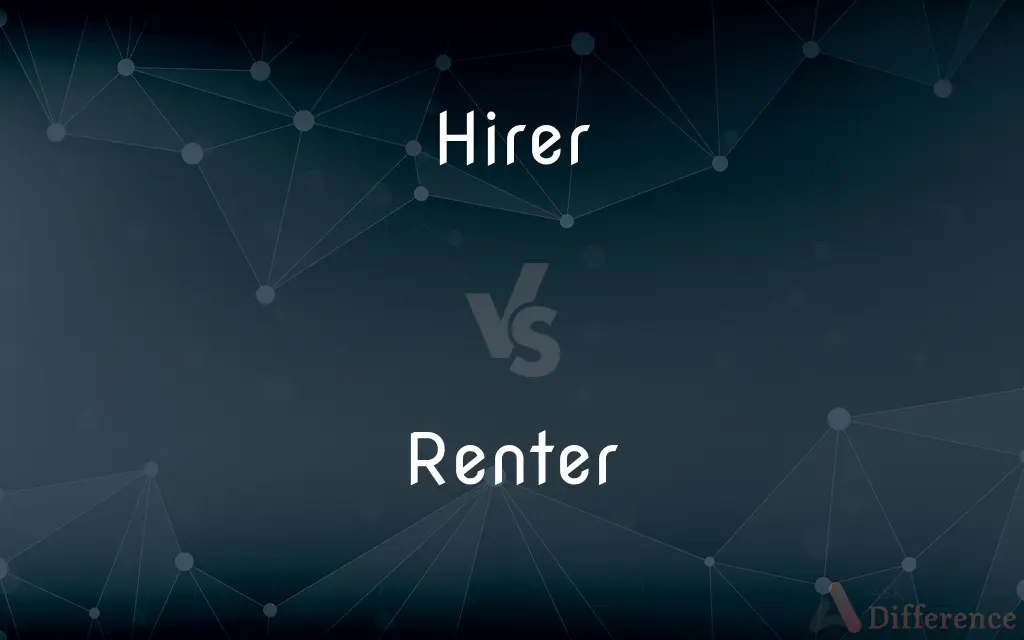Hirer vs. Renter — What's the Difference?
By Tayyaba Rehman & Fiza Rafique — Updated on April 20, 2024
A "hirer" engages services or temporarily acquires goods, often for short terms, while a "renter" typically leases property, especially real estate, for longer durations.

Difference Between Hirer and Renter
Table of Contents
ADVERTISEMENT
Key Differences
A hirer typically engages in the temporary use of assets or services, often on a short-term basis, such as hiring equipment or vehicles. On the other hand, a renter usually involves a longer-term agreement, particularly in the context of leasing homes or apartments.
In terms of agreements, hirers might deal with contracts that allow for hourly or daily use, focusing on temporary possession for specific tasks. Conversely, renters often sign leases that cover months or years, providing longer stability and use.
For instance, a hirer may pay to use a car for a weekend trip, emphasizing short-term utility. Whereas a renter might lease the same car for several months, indicating a more permanent arrangement within the context of temporary usage.
Financial commitments can also differ; hirers may face higher rates for the short-term but avoid long-term financial obligations. In contrast, renters typically benefit from lower periodic payments but commit to payments over a longer period.
The legal responsibilities can vary. Hirers are responsible for the asset during the hiring period without concerns about maintenance post-use. Renters, however, might be responsible for maintenance and other ongoing concerns during the lease period.
ADVERTISEMENT
Comparison Chart
Duration
Short-term, e.g., hours to days
Long-term, e.g., months to years
Common Usage
Vehicles, tools, equipment
Residential or commercial properties
Financial Terms
Higher rates, no long-term commitment
Lower periodic payments, long-term commitment
Legal Obligations
Limited to duration of hire
Includes maintenance, possible renovations
Agreement Type
Hire agreement
Lease agreement
Compare with Definitions
Hirer
Typically faces variable costs based on usage.
The construction company was a major hirer of heavy machinery.
Renter
Faces penalties for breaking lease terms early.
The renters faced a fine for vacating the property early.
Hirer
Often involved in short-term agreements.
She became a hirer of luxury cars for special occasions.
Renter
Commits financially for the duration of the lease.
Renters of the office space had a three-year lease.
Hirer
Uses hiring to avoid long-term investments.
They were regular hirers of video game consoles.
Renter
Engaged in a formal lease agreement.
As renters, they had certain rights and responsibilities.
Hirer
A person who temporarily acquires goods or services.
The event planner was a frequent hirer of audio equipment.
Renter
A person who leases property, usually long-term.
The family was a renter of a seaside apartment.
Hirer
Engages in hiring for specific needs.
As a hirer, his responsibility was to return the tools in good condition.
Renter
Often responsible for maintenance.
The renters were required to maintain the yard as part of their lease.
Hirer
To engage the services of (a person) for a fee; employ
Hired a new clerk.
Renter
A person who rents a flat, car, or other object.
Hirer
To engage the temporary use of for a fee; rent
Hire a car for the day.
Renter
A rented car or video cassette.
Hirer
To grant the services of or the temporary use of for a fee
Hired himself out as a cook.
Hired out the cottage for the summer.
Renter
A male prostitute.
Hirer
To obtain work
She hired on as a deck hand. He hired out as a photographer.
Renter
One that receives payment in exchange for the use of one's property by another.
Hirer
The act of hiring.
Renter
One that pays rent for the use of another's property; a tenant.
Hirer
The condition or fact of being hired.
Renter
One who rents property or other goods from another.
Hirer
Payment for services; wages.
Renter
(legal) One who owns or controls property and rents that property to another.
Hirer
Payment for the use of something.
Renter
(rent boy) Male prostitute.
Hirer
(Informal) One who is hired
Two new hires in the sales department.
Renter
(informal) A film worth renting, but not possibly worth visiting a cinema to see.
Hirer
Agent noun of hire: someone who hires.
Renter
To sew together so that the seam is scarcely visible; to sew up with skill and nicety; to finedraw.
Hirer
One who hires.
Renter
To restore the original design of (a tapestry) by working in new warp.
Hirer
A person responsible for hiring workers;
The boss hired three more men for the new job
Renter
One who rents or leases an estate; - usually said of a lessee or tenant.
Renter
To sew together so that the seam is scarcely visible; to sew up with skill and nicety; to finedraw.
Renter
To restore the original design of, by working in new warp; - said with reference to tapestry.
Renter
Someone who pays rent to use land or a building or a car that is owned by someone else;
The landlord can evict a tenant who doesn't pay the rent
Renter
An owner who receives payment for the use of their property by another
Common Curiosities
Can a hirer use the hired property for any purpose?
Hirers must use the property according to the terms specified in the hire agreement, typically for the intended purpose only.
What are the benefits of being a hirer?
Benefits include flexibility, lower long-term financial commitment, and access to a variety of goods or services.
What defines a hirer in a legal context?
Legally, a hirer is defined as someone who has temporary possession of goods or services under a hire agreement.
What are the disadvantages of renting?
Disadvantages include longer-term financial commitment, responsibilities for maintenance, and less flexibility to change terms.
What happens if a hirer damages the property?
A hirer would typically be responsible for any damage caused during the hire period and may be required to pay for repairs or replacement.
Is subletting allowed for hirers and renters?
Subletting is generally not permitted for hirers but may be possible for renters if agreed upon in the lease.
What legal protections do renters have that hirers might not?
Renters often have more extensive legal protections regarding eviction, rent increases, and property conditions.
Can hirers extend their hire period easily?
Extending a hire period can generally be done easily if the item is not needed elsewhere, depending on the terms of the agreement.
What responsibilities do renters have that hirers do not?
Renters often have responsibilities like property maintenance and adherence to longer-term lease conditions, unlike hirers.
How does the cost comparison between a hirer and a renter generally play out?
Hirers may pay more per day or hour compared to renters, who benefit from longer-term, lower periodic rates.
How flexible are hire terms compared to rental agreements?
Hire terms are usually more flexible, allowing for shorter engagement periods, whereas rental agreements are less flexible with longer durations.
What is the typical duration of a hire agreement?
Hire agreements typically last from a few hours to several days or weeks, depending on the item and need.
How do hirers and renters differ in terms of service engagement?
Hirers engage services or goods temporarily for specific tasks, while renters engage in ongoing use of a property.
Which is more cost-effective in the long term, hiring or renting?
Renting can be more cost-effective in the long term, especially for needs that require prolonged use.
Do hirers need to insure the hired property?
While not always mandatory, it's often advisable for hirers to insure the property against potential damage during the hire period.
Share Your Discovery

Previous Comparison
Rendition vs. Version
Next Comparison
Joy vs. RaptureAuthor Spotlight
Written by
Tayyaba RehmanTayyaba Rehman is a distinguished writer, currently serving as a primary contributor to askdifference.com. As a researcher in semantics and etymology, Tayyaba's passion for the complexity of languages and their distinctions has found a perfect home on the platform. Tayyaba delves into the intricacies of language, distinguishing between commonly confused words and phrases, thereby providing clarity for readers worldwide.
Co-written by
Fiza RafiqueFiza Rafique is a skilled content writer at AskDifference.com, where she meticulously refines and enhances written pieces. Drawing from her vast editorial expertise, Fiza ensures clarity, accuracy, and precision in every article. Passionate about language, she continually seeks to elevate the quality of content for readers worldwide.
















































